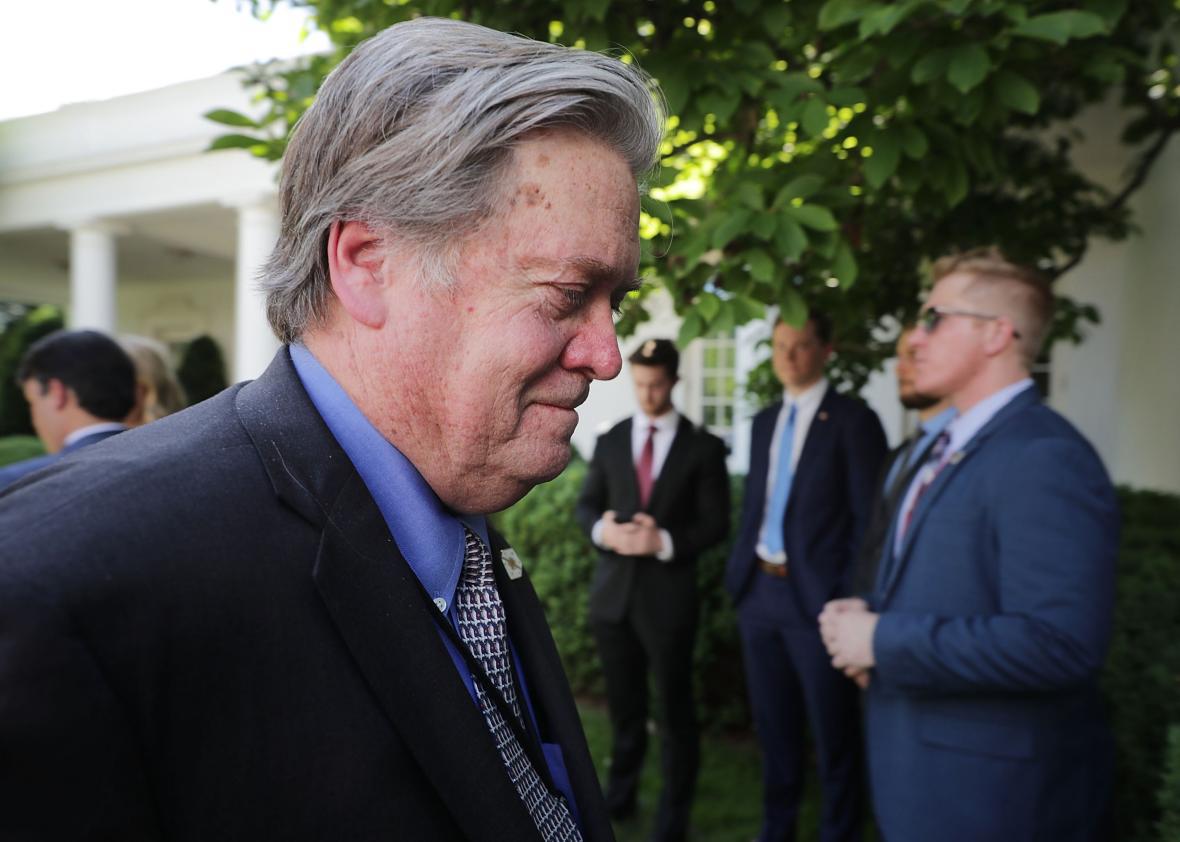It was quite surprising to see White House chief strategist Steve Bannon rule out military force so definitively in a new interview with the American Prospect’s Robert Kuttner:
There’s no military solution [to North Korea’s nuclear threats], forget it. Until somebody solves the part of the equation that shows me that ten million people in Seoul don’t die in the first 30 minutes from conventional weapons, I don’t know what you’re talking about, there’s no military solution here, they got us.
This is a pretty good summation of the problem. The prospect of a scenario that a recent Atlantic cover story by Mark Bowden called “one of the worst mass killings in human history” looms over the loose talk of a first strike against North Korea. Some argue that it’s worth risking such a scenario to prevent one in which North Korea could strike the U.S. with nuclear weapons. “If thousands die, they’re going to die over there,” Sen. Lindsey Graham has said. Responding to Bannon’s comments, Joint Chiefs Chairman Gen. Joseph Dunford acknowledged Thursday that a military solution in North Korea would be “absolutely horrific,” but that allowing North Korea to possess nuclear-armed ballistic missiles that could threaten the U.S. was “unimaginable.”
To Bannon’s credit, the public should understand the stakes and risks involved here. (Whether they care is another question.) It’s also not that surprising that he would be opposed to military solutions. Even if it’s motivated by white nationalism and reflexive isolationism, Bannon’s skepticism about military intervention can occasionally make him sound closer to the anti-war left than to the hawks within the Republican Party and military. (See also his clashes with National Security Adviser H.R. McMaster over U.S. policy in Afghanistan.) And as Bannon explained in his interview with Kuttner, he sees the North Korea crisis as an unwelcome distraction from the much more consequential trade war with China and is particularly miffed by the idea of backing off challenges to China’s trade policy in order to secure its help with North Korea. (Trump’s honeymoon period with Xi Jinping in April must have driven Bannon nuts.)
But even if it’s not surprising that Bannon feels this way, the mixed signals coming out of this administration must be whiplash-inducing for the people on the front lines of this crisis.
It’s pretty clear at this point that President Trump’s threats to rain down “fire and fury” on North Korea were something less than a statement of official policy and that there’s not actually any serious momentum toward military action against Kim Jong-un’s regime. Still, other senior officials including Secretary of State Rex Tillerson, Secretary of Defense James Mattis, and Vice President Mike Pence have consistently maintained that military options are “on the table” for dealing with the North Korean nuclear threat. This makes some sense: Reluctant as we might be to use military force, there’s little to gain from telling an adversary that it’s completely out of the question.
Just two days ago, South Korean President Moon Jae-in warned the U.S. that “Military action on the Korean Peninsula can only be decided by the Republic of Korea and no one may decide to take military action without the consent of the Republic of Korea.”
Today, South Koreans saw one of the U.S. president’s closest advisers going to the other extreme, saying in the interview that he would consider a deal in which the U.S. removed its troops from South Korea in exchange for the North freezing its nuclear program—a move South Koreans would likely also oppose. Then, hours later, Dunford contradicted Bannon, saying, “We have a long-term alliance commitment with South Korea.”
Thankfully, tensions are easing somewhat, with North Korea pausing its plan to fire a missile toward Guam. But there’s every reason to expect another provocation from Pyongyang, and when it comes, it’s going to be very hard to parse who actually speaks for the United States.
